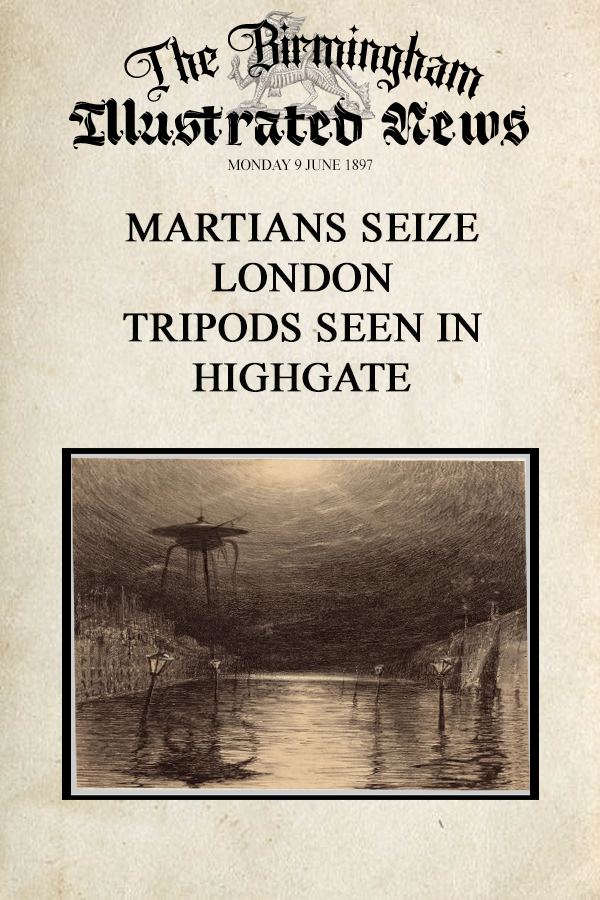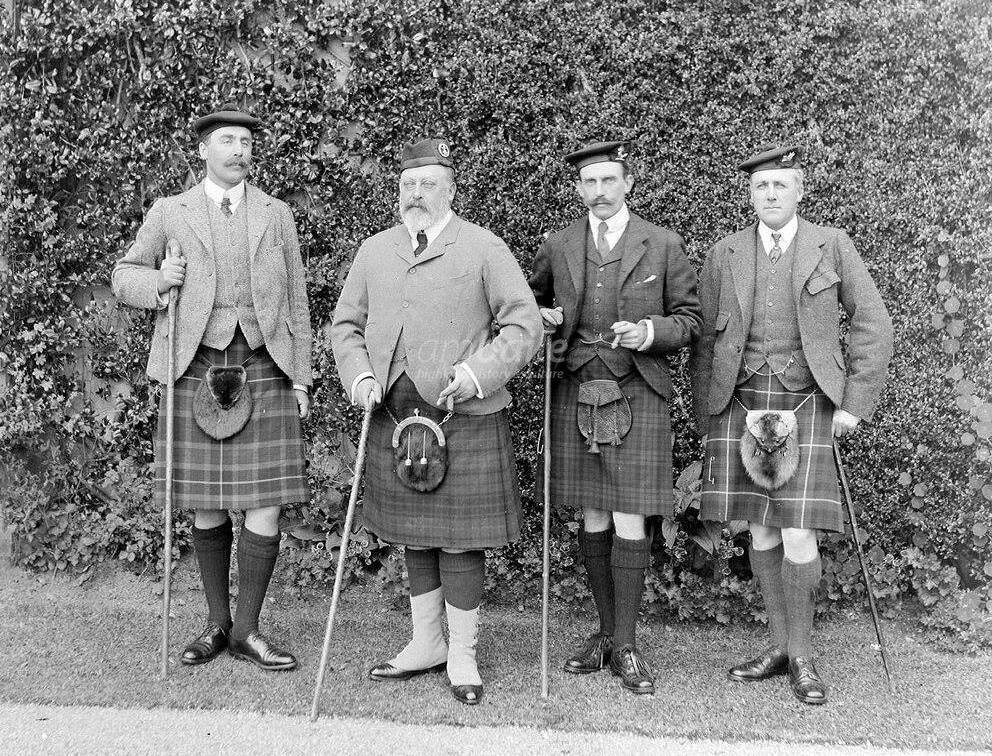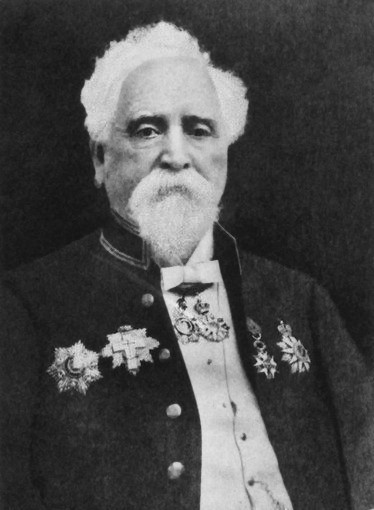The Martians Seize London
As the British government flees to Birmingham and London panics, Wells becomes trapped with the curate in a house in Sheen, when the 6th Martian cylinder lands next door, collapsing the building on top of them.
Today the government establishes the #Gascoyne-Cecil-Line which follows the Great Western Railway’s mainline from London to Bristol, and we catch up with Lt Carver on board HMS Thunder Child who is tasked with assisting with the Queen’s evacuation to France.
We meet the inventor Hiram Maxim (the inventor of the Maxim Machine Gun) who is watching the Woking Pit where the Martians have erected a massive tower. And Sir J Dullanty (chemist, engineer, inventor, and philanthropist) whose Scottish estate (Rotch Wood) abutted Balmoral enters the story for the first time.
For Toni, today is a day of fear, tears, and emotional fatigue. Toni is a strong independent woman, but even the strongest must acknowledge their fears.
Woke early, felt a little better and more hopeful this morning. Can’t believe I #slept. @lizcadbury is down the hall checking on @sirjohntheengineer He’s old, but #clever. She reckons he might have some #ideas. He did build the railways…
FROM GENERAL SIR STEPHENSON STOP
TO: LT. JAMES DULLANTY NO 4 COY SPEC OPS STOP
WE HAVE LOST LONDON STOP THE ARMY IS FORMING A NEW LINE ALONG THE GWR MAINLINE TO BRISTOL STOP IT IS VITAL YOU OBTAIN INFORMATION ON THE MARTIANS AND THEIR CAPABILITIES STOP AS DISCUSSED ALL INFORMATION TO BE PROVIDED TO OUR RESEARCH FACILITIES AT THE ROTCH WOOD ESTATE ENDS
We have had two stampedes in the tunnel.
Started a breakfast handover.
We station more guides to keep the refugees moving through the tunnels.
Brown has got hold of thousands of Union Jack Flags that would have been used for the Diamond Jubilee. We can use them to indicate safe passages and to wave refugees through.
With half the government now gathered at Birmingham, the Government orders the military to hold the Martians to the south of the newly established #Gascoyne-Cecil-Line, named after the then PM who drew the line on a map following the GWR’s mainline from London to Bristol.
Recognising the importance of Swindon to the national rail network, the CinC Field Marshal Wolseley moves to reinforce Swindon, Didcot and other towns along ‘the Line’, and orders enormous quantities of high explosives to be prepared to be used in automatic mines across the Midland counties.
FROM GENERAL SIR STEPHENSON STOP
TO: JAMES DULLANTY
BE AWARE THAT YOUR GODMOTHER IS ON ROUTE TO BRADWELL-ON-SEA WITH SMALL ESCORT STOP PLEASE PROVIDE ADDITIONAL PERIMETER SECURITY STOP
STEPHENSON ENDS
Oh joy, a visit from ‘Aunt Vicky’. Bradwell-On-Sea is 12 hours away. At least we’ve managed to get both platoons mounted, and everyone has now been introduced to the dynamite. Still can’t locate additional fuses – typical SNAFU.
From the personal log of Lt. Roger Carver, #RoyalMarines HMS Thunder Child, 09 June 1897 10:25 GMT
Thunder Child plowed serenely through the water. Shipping of sort slipped around us. Everything from giant three-funnelled ocean liners to simple fishing smacks jockeyed for position, trying to close into the beach and piers to take off as many of the poor souls as possible who were crowded onshore.
From the personal log of Lt. Roger Carver, #RoyalMarines HMS Thunder Child, 08 June 1897 10:25 GMT
“Flag hoist from the Majestic, sir,” reported the lookout.
I raised my glasses and read the string of signal flags fluttering in the stiff breeze from the flagship’s mast. “Report to the captain at once,” I said to the young midshipman beside me, “It seems we’re being summoned aboard.”
From the personal log of Lt. Roger Carver, #RoyalMarines HMS Thunder Child, 09 June 1897 10:41 GMT
Captain Allenby and I stepped from Thunder Child’s whaleboat onto the first rung of rope ladder that led up to Majestic’s deck, piped aboard by the bosun’s whistle.
From the personal log of Lt. Roger Carver, #RoyalMarines HMS Thunder Child, 09 June 1897 10:44 GMT
…I found it odd. Despite what they had heard, the crew seemed complacent, disciplined, but acting in such a relaxed manner that belied the threat to the whole world. If only they knew…
From the personal log of Lt. Roger Carver, #RoyalMarines HMS Thunder Child, 09 June 1897 10:46 GMT
We were escorted into the wood-panelled sea cabin of Admiral Sir Walter Kerr. He motioned to the two chairs before his mahogany desk. “Sit down gentlemen.” He lit his cigar and puffed on it. “A shame about the Colossus. We could’ve used her.”
“Yes, Admiral,” agreed Allenby, absently.
“…of course, there’s no understating your bravery or that of the crew of Thunder Child,” continued the Admiral. “It’s just these… things…”
“I know sir,” said Allenby “There’s no word to describe them…”
“…but alien,” I found myself piping up suddenly.
From the personal log of Lt. Roger Carver, #RoyalMarines HMS Thunder Child, 09 June 1897 10:48 GMT
“Yes,” Kerr forced a smile. “Quite… alien. Given your experience with the Martians, you’ll stay close in shore, and acting as screen for the civilian shipping,” said Kerr puffing his cigar. ”That is your official role. “
“Unofficially,” said the admiral, “you will screen Her Royal Majesty and members of the royal household. We will be evacuating them to France. You will act as escort to the fast yacht Turbina and see them out of threatened waters.”
“The situation is far worse than the Government has let on,” said Kerr shaking his head gravely, as if reading our shocked expressions. “The monsters will be on us soon. London is about to fall to the Martians. Both the Government and the Royal Family have fled the city.”
“Astounding,” said Allenby. “Things are that bad?”
“Worse,” Kerr snorted. “The Cabinet has retreated to Birmingham; and what’s left of the Army is in retreat. They have been ordered to form a new line along the Thames, and from Moulesford along the GWR line to Bristol but who knows if they can hold.”
The enemy has yet to seize London,” Kerr continued. But with London now cut off to the West and soon likely to the North, it won’t last long.”
“And,” said Kerr with all the studied calm of a man facing his execution, “there have been mutinies on the torpedo-boats of the Thames Squadron.”
“Mutinies?” said Allenby in disbelief.
“Unfortunate business,” Kerr nodded. “We’ve also had instances of the wireless interference you’ve reported. By means of signal triangulation, we have placed its source around Woking. We believe the Martians have established a powerful wireless beacon to guide their cylinders.”
“There’s not more to add,” concluded Kerr. “The Channel Squadron will stand to further out and prevent a Martian crossing of the channel.”
I said nothing. How long would that plan last when the Martians began landing outside Paris and Berlin?
From the log of HMS Thunder Child, 09 June 1897 11:25 GMT
Captain Allenby and Lt Commander Carver returned to ship from Majestic.
The Midland Railway issues the following notice:
“Trains are now being run north from St. Albans to relieve the congestion of the home counties.”
What it fails to mention is that the Company had been forced to replace over 150 staff who deserted their posts the previous day.
Churches and other individuals step forward to assist the government almost broken by the scale of the disaster. A placard in Chipping Ongar announces to refugees that large stores of flour are available in northern towns, and bread will be distributed within 24 hours.
Sergeant Donaldson just rode in with a message from Lt. Kilvaney warning us about the Martian’s black-dust. The Sergeant was just about all-done-in from the ride and I sent him off to rest and telegraphed the message onto Papa. Poisonous stuff — the 4th platoon lost a lot of good men. Usefully, it seems the Martians can disperse it with steam.
Sir J Dullanty – whose Scottish estate (Rotch Wood) abutted Balmoral, was a chemist, engineer, inventor, and philanthropist. The Dullenty family often visited when the Queen when she was in residence. The Queen in fact serving as the god-mother to his youngest son. Dullanty had a large laboratory and had often communicated with Alfred Nobel before Nobel’s death in 1896.
Sir J Dullanty found himself driven to invent the first gas mask against black dust, as a result of communications from his son. Initially a simple hessian sack with glass goggles, the hood placed over the head and tied at the neck had to be kept wet. Recognising its many failings, a mask with an external box respirator with a built in trickle feed was issued within 17 days (22nd June).
Unfortunately, we have been unable to discover any records detailing the agreement to centralise information facilities at Rotch Wood. Sir J Dullanty was in Scotland on the 6th, but as a close confident of the Queen, and a personal friend of the then Secretary of State for War, it is possible that the decision was one taken between the Queen and the Secretary of State.
Churchill, in his ‘Hidden Histories’ later suggested that it may have due to the fact that #RotchWood was some considerable distance from the Martians, had a private telegraph line, and large laboratory, and abutting Balmoral #RotchWood’s location adjacent to Balmoral gave it easy access to the train network, and the protection of those units of the Grenadier Guards, the Coldstream Guards, the Scots Guards, the Irish Guards and the Welsh Guards emplaced around Balmoral.
Unfortunately, given the amount of secrecy that subsequently surrounded the #RotchWood establishment it is unlikely we will ever find out.
It is believed that this photograph taken at Glenquoich in 1905 of King Edward VII may be the only photograph we have of the 1st Earl RotchWood. The Earl being the 3rd from the left.
Now feeling worse again. #Martians are stalking through London. We can see them from our building. #cantheyseeus?
From the log of HMS Thunder Child, 09 June 1897 13:11 GMT
Thunder Child has intercepted and taken aboard a group of mutineers from one of the Thames Squadron torpedo-boats, HMS Terrible. Captain to convene a court-martial on the ship’s quarter-deck.
From the personal log of Lt. Roger Carver, #RoyalMarines HMS Thunder Child, 09 June 1897 14:12 GMT
Four sullen men, the highest-ranking a leading seaman sat on the bench, flanked by two of the ship’s Marines.
“It was madness, that’s it what was, ordering us to charge up the river to do what?” He sneered. “We didn’t get more than halfway when we were met by a wall of black smoke and the Heat Ray.”
From the log of HMS Thunder Child, 09 June 1897 14:30 GMT
After a brief trial, the captain has pronounced the mutineers guilty of mutiny and desertion in the face of the enemy. Sentenced them to death by firing squad; sentence carried out immediately on the quarter-deck.
From the personal log of Lt. Roger Carver, #RoyalMarines HMS Thunder Child, 10 June 1897 16:40 GMT
“The world is coming to an end, and yet this is what we do,” said Farmer, watching the detail slide the wrapped bodies over the side.”
“They mutinied and deserted in the face of the enemy,” was all I could reply.
“Really? I thought better of you, Carver,” Farmer said, and turned on his heel.
Curies have been little help. They have no idea how the Martian heat ray works.
Vogan and I begin to plan to take a tripod down to get their heat gun.
When the lookout use the “U” flags to warn of an incoming tripod the refugees trying to get into the station panic, and people are killed in the crush.
The tripod doesn’t see the easy pickings as they’re still staking out the bridges. We were lucky.
#hiding
#havetheygonepastyet?
More #blacksmoke
Weird thing happened. #Martians cleared sea of #blacksmoke with ?steam
So many #bodies #devastated #ihavenomoretears
From the personal journal of Hiram Maxim, Inventor:
I have returned from my week’s reconnaissance of the Martian pits and works near Woking. Nothing human lives in that blighted town. It is a forest of blackened walls without roofs. Tangles of red weed run riot in what were once lush green gardens.
My survey confirms that the Martians have driven out all humanity from a three-mile radius around their initial landing site in Woking. No reminder of humanity remains, save for the shadow of a mother embracing her child, permanently etched on a wall by the Heat Ray.
I crept to a point within one hundred yards of the Martian pit on Horsell Common. I could see the tower of adamantine metal, taller even than the tower raised by Monsieur Eiffel in Paris. It crackles with a blueish glow.
I have developed a theory regarding the purpose of the Martian tower at Woking. By the initial pattern of fall of the enemy cylinders, I believe the tower to be broadcasting a powerful wireless beacon used to guide incoming Martian craft for their landings.
As I draw closer to the tower, I feel a most curious effect: which I can describe as the feeling of pins and needles running up and down the length of my body. Was this strange energy being generated by the tower? This cannot be just the beacon; I believe there is more here.
With the first phase of the enemy’s operations concluded, it is clear from the patrolling war machines that the Martians view the tower as critical to their continued success here on Earth. I believe there is a second, yet undiscovered but more important reason behind the tower. I now view the tower’s destruction as critical to the survival of humanity.
One day, I witnessed a group of soldiers plus a few armed civilians, try to storm the Martian pit by surprise. I watched as they crept by me, within a few feet of my own hide, rose to charge the position, and were slaughtered to a man by the Heat Ray. I vowed my own attempt would succeed.
Adamantine is a term coined by Maxim to describe a unique of aluminium and magnesium, and used by the Martians because of its unusual lightness and toughness.
The Curies report that black smoke is rendered harmless with water.
They put together a system that bubbles our air through water in a wine bottle to protect us from the dust.
I have recruited enough men with artillery experience to re-man the artillery battery at Weybridge and bring down a tripod
So many strange #sounds #aloo #sirensounds #spinechilling
At least I am #notalone
Wells and the Curate, still trapped within the house, discover that part of the outside wall of the house has collapsed, and through a small hole they can see into the pit created by the Martian impact. A pit already vastly larger than the one Wells had seen at Woking.
It is through Wells’ observations, and his later publication of those observations, that we are fortunate to know so much about the Martian’s daily routines.
Wells notes that one of first things he notices, on the far edge of the pit, is one of the great fighting-machines, standing stiff and tall against the evening sky deserted by its occupant.
While down in the pit, however, Wells observes an extraordinary glittering mechanism busy in further excavation. Given the importance of what was later to be known as a “handling-machine” we have chosen to report his subsequent description in full.
“The mechanism, which has subsequently had a significant impact on subsequent terrestrial invention, appears as a metal spider with 5 jointed, agile legs, and a large number of jointed levers, bars, and clutching tentacles about its body…
“Most of its arms were retracted, but 3 long tentacles were retrieving the rods, plates, and bars which lined, and apparently strengthened the walls of the cylinder. These, as it extracted them, were lifted out and deposited upon a level surface of earth behind it…
Wells finishes: “Its motion was so swift, complex, and perfect that at first I did not see it as a machine, in spite of its metallic glitter. The fighting-machines were co-ordinated and animated to an extraordinary pitch, but nothing to compare with this.”
And once again another Martian shell falls, this time upon Primrose Hill. This is the 7th, and marks a significant recognition by the Martian of their control of the planet that they dare to land in the centre of London, the world’s most populous city.






